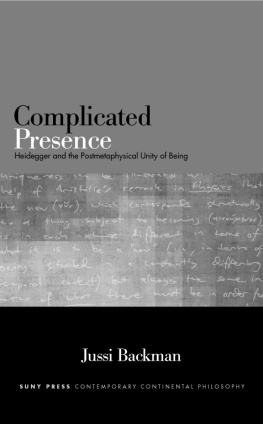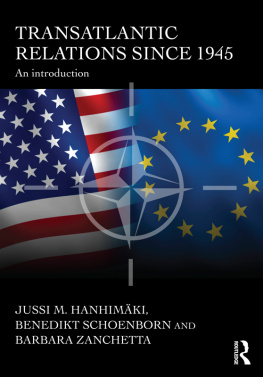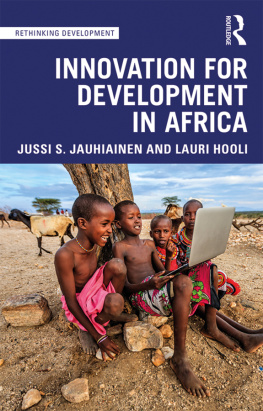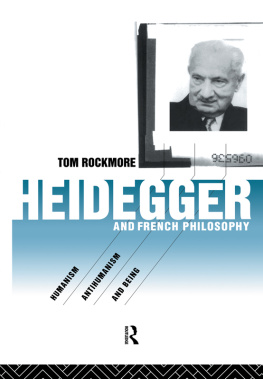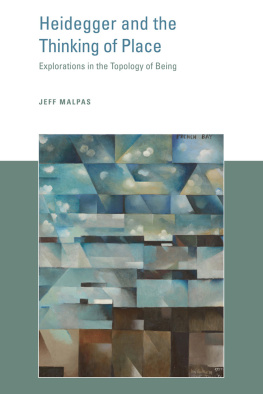Complicated Presence
SUNY series in Contemporary Continental Philosophy
Dennis J. Schmidt, editor
Complicated Presence
Heidegger and the Postmetaphysical Unity of Being
JUSSI BACKMAN
Published by State University of New York Press, Albany
2015 State University of New York
All rights reserved
Printed in the United States of America
No part of this book may be used or reproduced in any manner whatsoever without written permission. No part of this book may be stored in a retrieval system or transmitted in any form or by any means including electronic, electrostatic, magnetic tape, mechanical, photocopying, recording, or otherwise without the prior permission in writing of the publisher.
For information, contact State University of New York Press, Albany, NY
www.sunypress.edu
Production, Diane Ganeles
Marketing, Michael Campochiaro
Library of Congress Cataloging-in-Publication Data
Backman, Jussi, 1977
Complicated presence : Heidegger and the postmetaphysical unity of being / Jussi Backman.
pages cm. (SUNY series in contemporary continental philosophy)
Includes bibliographical references and index.
ISBN 978-1-4384-5649-2 (hardcover : alk. paper)
ISBN 978-1-4384-5650-8 (e-book)
1. Heidegger, Martin, 18891976. 2. One (The One in philosophy) 3. Metaphysics.I. Title.
B3279.H49B2434 2015
111.82dc23 | 2014027590 |
10 9 8 7 6 5 4 3 2 1
for Elsa and Lauri
We know about God, spirit, the world, and so forth, we know other categories of thought, whereas the Greeks had before them only the sensible world []; they had nothing of a higher {intellectual} kind before them in this sensible world; they stood isolated. Because they find no satisfaction therein the sensible world and in the mythical world alike{the Eleatics} therefore reject all of that as something untrue and by so doing arrive at this pure, abstract thought that being belongs only to the One. This is a tremendous advance. With the Eleatic school, thought, properly speaking, begins to be free for the first time on its own account [] Modern reflection has taken a circuitous route, [] but the content or the result in the recent and the Eleatic philosophies is the same, namely, the One.
G. W. F. HEGEL: Lectures on the History of Philosophy (182526)
What has happened, at bottom? The feeling of valuelessness was reached with the realization that the overall character of existence may not be interpreted by means of the concept of aim, the concept of unity, or the concept of truth. Existence has no goal or end; any comprehensive unity in the plurality of occurrences is lacking: the character of existence is not true, is false One simply lacks any reason for convincing oneself that there is a true world Briefly: the categories aim, unity, being which we used to insert some value into the worldwe pull out again; so the world looks valueless
FRIEDRICH NIETZSCHE: Collapse of Cosmological Values (1887/88)
Being at one is godlike and good; whence, then, comes the craving Among humans, that only some One, and a One only, be?
FRIEDRICH HLDERLIN: The Root of all Evil (ca. 1799)
Contents
List of Illustrations
Acknowledgments
Heidegger once advised his students to spend preferably 10 to 15 years studying Aristotle in order to gain a sufficient philosophical basis for approaching Nietzsche. In this regard, Heidegger, whose work has preoccupied me in various ways since the turn of the millennium, has been my personal Aristotle, a point of entry that has definitively shaped my understanding of the tradition and the contemporary situation of Western philosophy. The present book, which originally evolved from my doctoral dissertation and epitomizes a prolonged involvement with Heideggers opus, is the fruit of the particular realization of the extent to which the philosophical tradition has revolved around the dialectic of unity and multiplicity, of the ways in which the notion of an ultimate unity is being challenged and transformed in contemporary thought, and of Heideggers key role in this process.
Philosophical studylike life itselfhas two intertwining aspects. On the one hand, it is an autotelic quest for insights and conceptual articulations for their own sake, the peculiar type of activity or praxis designated by Aristotle as theria. On the other hand, particularly in the modern academic world, it inevitably involves a process of scholarly production, a poisis oriented to a specific outcome, in this case the present book. Neither of these activities is possible in isolation, without communal spheres of discussion, cophilosophizing, and concrete intellectual collaboration. Both aspects of the process that brought this book into being thus leave me deeply indebted to a great number of people, groups, and institutions, all of whom I cannot possibly hope to name here.
I owe particular gratitude to two collective entities, the Research Group in European Thought (funded by the Emil Aaltonen Foundation in 200106) and the research project European Rationality in the Break from Modernity (Emil Aaltonen Foundation/Academy of Finland, 200813), which provided the immediate collective frameworks for my doctoral studies and my postdoctoral work at the University of Helsinki. These groups were directed by my two key supervisors and mentors, Juha Himanka and Sara Heinmaa, without whose phenomenological guidance philosophy would not be for me what it is. Their other members, Mirja Hartimo, Susanna Lindberg, Miika Luoto, Timo Miettinen, Simo Pulkkinen, Susanna Snell, and Joona Taipale, have all had a decisive influence on the materialization of this study in the form of innumerable discussions, textual commentaries, and profound philosophical comradeship. The final stages of the process would not have been possible without the support of my colleagues at the University of Jyvskyl: Jussi Kotkavirta, Arto Laitinen, Mika Ojakangas, Miira Tuominen, and Mikko Yrjnsuuri.
For priceless comments and insights on parts of this book and on related texts and presentations, linguistic advice, and vital encouragement in general, I thank Rudolf Bernet, Walter Brogan, Marcia Cavalcante Schuback, Antonio Cimino, Daniel Dahlstrom, Franoise Dastur, Diego DAngelo, Karen Gover, Saara Hacklin, Gert-Jan van der Heiden, Topi Heikker, Juho Hotanen, Auli Kaipainen, Mika Kajava, Niall Keane, Tobias Keiling, Pavlos Kontos, Virpi Lehtinen, Artemy Magun, Brendan Mahoney, Nikola Mirkovi, Andrew Mitchell, Joan Nordlund, Mika Perl, Lauri Rauhala, Martina Reuter, Pajari Rsnen, Hans Rainer Sepp, Vigdis Songe-Mller, Anthony Steinbock, Franco Volpi, Thomas Wallgren, Charlotta Weigelt, Fredrik Westerlund, Guang Yang, and Holger Zaborowski. I am thankful to Jochen Stollberg at the Universittsbibliothek Johann Christian Senckenberg in Frankfurt am Main for access to several transcripts of Heideggers lecture courses and seminars in the Herbert Marcuse Archive. For financial support, I am grateful to the Academy of Finland, the Emil Aaltonen Foundation, the Finnish Cultural Foundation, the Rector of the University of Helsinki, and the University of Helsinki Network for European Studies. Very particular thanks are due to the people at SUNY Pressto Andrew Kenyon for his amazing helpfulness, patience, and efficiency in the acquisitions process, to Diane Ganeles for production, to Sharon Green for copyediting, to Sue Morreale for typesetting, and to Michael Campochiaro for marketingand to the three anonymous reviewers of the manuscript whose expert and apposite critical comments gave the crucial impetus for final revisions. The focusin the literal sense of the hearthof my personal existence has been and remains my family: Kaisa, Elsa, and Lauri.

